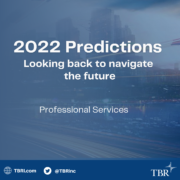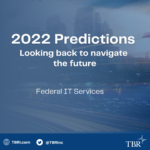Will IT services revenue grow despite the competitive talent environment?
Revenue expansion in the IT services sector continues, driven by vendors’ investments in talent and portfolio expansion and emphasis on strengthening relationships with customers and alliance partners.
While political and macroeconomic challenges such as rising inflation and the natural gas crisis are factors that might create pockets of slower growth, TBR expects the overall IT services market to continue to grow in the coming quarters. IT systems have become corporate utilities that enable clients to transform business models, contain costs and accelerate growth, and TBR expects demand for IT services around digital transformation to remain elevated. For the rest of 2022, attracting and managing talent will remain vendors’ core challenge to successfully growing revenue and managing costs.
Prediction No. 1: Focus on talent management, refined during the pandemic, will recede in a post-pandemic environment
Senior Analyst Elitsa Bakalova: Talent management remained a core priority and challenge for IT services providers, and none of the standard HR approaches changed during the first nine months of 2022 as vendors strived to capture rising demand for digital transformation.
As TBR predicted at the end of 2021, attracting, retaining, upskilling, promoting and rewarding talent are all necessary HR motions and further accelerated during the past three quarters. There is an ever-increasing need for people as vendors build their benches to capture opportunities and support revenue growth. New job creation and the gradual alleviation of pandemic pressures have encouraged employees to pursue career-building opportunities, leading to elevated employee attrition of 20.8% in 2Q22 compared to 16% in 2Q21, 14.1% in 2Q20 and 17.6% in 2Q19, on average, for the 31 vendors in TBR’s IT Services Vendor Benchmark. While vendors continue to recruit via traditional methods, more are investing in reskilling and upskilling as well as launching educational initiatives.
Finding and keeping employees in the IT services market is increasingly difficult as talent poaching intensifies for a finite number of resources and companies’ bookings remain high. Vendors continue to place a premium on skilled resources, offering sizable signing bonuses and higher wages. Increasing labor costs due to wage hikes and robust retention bonuses along with rising facility, travel and communication expenses are pressuring IT services vendors’ profitability.
Prediction No. 2: The decarbonization shift from promises to actual results opens a massive opportunity for IT services
Elitsa: This prediction remained true during the first nine months of 2022 as vendors TBR identified as decarbonization leaders continued to invest in developing their services and solutions portfolios to support clients’ sustainability initiatives and address their internal decarbonization-related pledges. As we anticipated, IT services vendors are increasingly bringing clarity to decarbonization by harnessing emerging technologies such as blockchain as well as established analytics and AI solutions.
According to TBR’s first Decarbonization Market Landscape, “Although some firms have been active over the last few decades around developing and acting on decarbonization strategies, many were induced — be it from competition, stakeholders or regulatory evolution — to improve, update, revisit or outright announce new net-zero targets, which in recent years have become somewhat of a comprehensive measure of a firm’s overall decarbonization efforts. … With a wider set of buyers relying heavily on technology to measure and manage emissions as well as advisory services to assess, plan and verify new initiatives, professional services vendors will continue to be key players in the enterprise decarbonization space. … Vendors must take care to continue to learn and stay up to date on reporting standards and regulatory change, supporting both internal and commercial efforts.”
Prediction No. 3: Blockchain winter ends and 5G & edge bloom in 2022, bringing new enhanced revenue streams to IT services vendors
Elitsa: While IT services vendors have increasingly announced investments in professional and managed services to enable adoption of blockchain, 5G and edge solutions, the trend is not mainstream across all 31 vendors in TBR’s IT Services Vendor Benchmark. However, select vendors have invested in expansion in the segments to benefit from diversified revenue streams.
As TBR expected, partnerships between IT services vendors and technology providers have been a key lever for increasing the value of vendors’ solutions and expanding their portfolio and client reach. For example, IBM partnered with Telus to deploy an edge computing platform across Canada, which expanded the reach of IBM Cloud Satellite by running the distributed cloud solution on Telus’ 5G network. Telus will leverage IBM Consulting services to implement AI and automation solutions, including products such as Cloud Pak for Network Automation. Atos partnered with Verizon to integrate Atos Computer Vision into Verizon’s multi-access edge computing network. This integration will bring video analytics services that utilize AI to customers and will provide Verizon with access to Atos’ BullSequana Edge servers to further advance 5G solutions.
During 2022 vendors have also leveraged acquisitions to expand their capabilities. For example, Atos acquired U.K.-based Ipsotek in 2021, adding software and IP to its solutions offerings to expand its edge AI/machine learning offerings and introduce video analytics solutions through Ipsotek’s VISuite. In 2022 IBM acquired U.S.-based Sentaca, a telecom consultancy and systems integrator, which strengthened IBM Consulting’s capabilities around helping communication service providers integrate with cloud-native services and architectures to better enable 5G for their customers.
Predictions is an annual TBR series examining market trends and business changes in key markets. 2022 covered segments included cloud, telecom, devices, data center, and services & digital.

 Technology Business Research, Inc.
Technology Business Research, Inc. Technology Business Research, Inc.
Technology Business Research, Inc. Technology Business Research, Inc.
Technology Business Research, Inc.